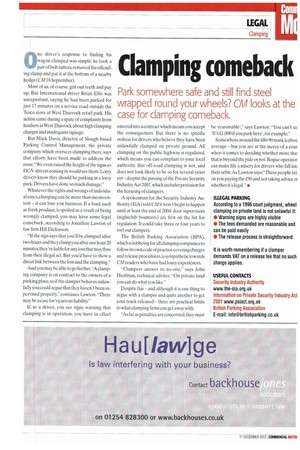Clamping comeback
Page 37

If you've noticed an error in this article please click here to report it so we can fix it.
Park somewhere safe and still find steel wrapped round your wheels? CM looks at the case for clamping comeback.
One driver's response to finding his wagon clamped was simple: he took a pair of bolt cutters, removed the offending clamp and put it at the bottom of a nearby hedge (CM 18 September).
Most of us, of course, grit our teeth and pay up. But International driver Brian Ellis was unrepentant, saying he had been parked for just 17 minutes on a service road outside the Tesco store at West Thurrock retail park. His action came during a spate of complaints from hauliers at West Thurrock about high clamping charges and inadequate signage.
But Mark Davis, director of Slough-based Parking Control Management. the private company which oversees clamping there, says that efforts have been made to address the issue:"We even raised the height of the signs so HGV drivers coming in would see them. Lorry drivers know they should be parking in a lorry park. Drivers have done so much damage."
Whatever the rights and wrongs of individual cases, clamping can be more than inconvenient — it can lose you business. If a load, such as fresh produce. is spoiled as a result of being wrongly clamped, you may have some legal comeback, according to Jonathan Lawton of law firm Hill Dickinson.
"If the sign says that you'll be clamped after two hours and they clamp you after one hour 20 minutes, they're liable for any loss that may flow from their illegal act. But you'd have to show a direct link between the loss and the clamping."
And you may be able to go further."A clamping company is on contract to the owners of a parking place. so if the damper behaves unlawfully you could argue that they haven't been supervised properly," continues Lawton. "There may be a case for vicarious liability."
If. as a driver, you see signs warning that clamping is in operation, you have in effect entered into a contract which means you accept the consequences. But there is no specific redress for drivers who believe they have been unlawfully clamped on private ground. All clamping on the public highway is regulated. which means you can complain to your local authority. But off-road clamping is not, and does not look likely to be so for several years yet — despite the passing of the Private Security Industry Act 2001,which includes provision for the licensing of dampers.
A spokesman for the Security Industry Authority (SIA) told CM it won't begin to happen until at least the end of 2004: door supervisors (nightclub bouncers) are first on the list for regulation. It could take three or four years to sort out dampers.
The British Parking Association (BPA), which is lobbying for all clamping companies to follow its own code of practice covering charges and release procedures. is sympathetic towards CM readers who have had lousy experiences.
"Clampers answer to no-one," says John Heafman, technical adviser. "On private land you can do what you like."
Despite this — and although it is one thing to argue with a damper and quite another to get your truck released — there are practical limits to what clamping firms can get away with.
"As far as penalties are concerned, they must be 'reasonable'," says Lawton. "You can't sa It's £1.000 if you park here', for example."
Somewhere around the £80-90 mark is abou average — but you are at the mercy of a COW when it comes to deciding whether more thai that is beyond the pale or not. Rogue operator can make life a misery for drivers who fall inti their orbit. As Lawton says:"These people rel. on you paying the £90 and not taking advice oi whether it's legal." •


























































































































































































